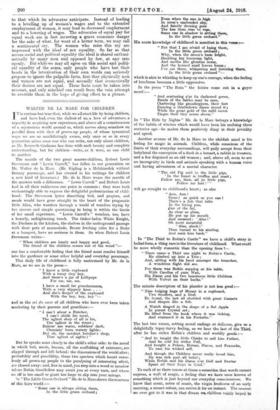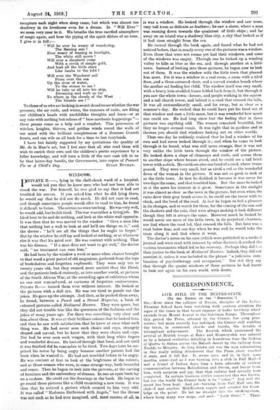WALTER DE LA MARE FOR CHILDREN.
T is curious but true that, while we all start life by being children, 1 and have had, even the dullest of us, a love of adventure, a rapacity in acquiring new experience, and above all a consciousness of a mysterious world around us, which moves along somehow on parallel lines with that of grown-up people, of whose tyrannical ways we are so annihilatingly aware, only once or so in every generation arises some one who can write, not only about children, as Mr. Kenneth Grahame has done with such beauty and complete understanding, but for children—write, as it were, as one child to another.
The mantle of the two great master-children, Robert Louis Stevenson and `,`. Lewis Carroll," has fallen in our generation on Mr. Walter de la Mare. (Mr. Kipling is a Melchizedek without literary parentage, and has created in his writings for children a new kind of literature.) Mr. de is Mare wears the mantle of the masters with a difference. " Lewis Carroll " and Robert Louis had in all their unlikeness one point in common : they were both enchantingly able to express the delightful pedestrianism of child- hood. The Stevenson lyrics describing bed, and prayers, and meals would have gone straight to the heart of the pragmatic little Alice, who wanders through a world of wonders trying by her sincere and simple questioning to bring it within the limits of her small experience. " Lewis Carroll's " wonders, too, have a homely, unfrightening touch. The tinker-laden White Knight, the Duchess in the kitchen, the shelves in the underground passage with their pots of marmalade, Bruno fetching cider for a Duke at a banquet, have no eeriness in them. So when Robert Louis Stevenson writes- " When children are lonely and happy and good, The friend of the children comes out of the wood "- one has a comfortable feeling that the friend must resolve himself into the gardener or some other helpful and everyday personage. This daily life of childhood is fully understood by Mr. de la Mare, as we see in the poem- " I know a little cupboard With a teeny tiny key, And there's a jar of Lollipops For me, me, me.
I have a small fat grandmamma, With a very slippery knee . . . And she's keeper of the cupboard With the key, key, key "— and in the cri du cceur of all children who have ever been taken marketing by their parents and guardians :—
" I -can't abear a Butcher, I can't abide his meat, The ugliest shop of all is his, The ugliest in the street; Bakers' are warm, cobblers' dark, Chemists' burn watery lights : But oh, -the sawdust butcher's shop, That ugliest of sights I "
But he speaks most clearly to the child's other side: to the mood in which bed, meals, lessons, all the scaffolding of existence, are slipped through and left behind: the dimensions of the world alter: probability and possibility, those two spectres which haunt cease- lessly all grown-up people to the paralysing of interesting effort, are chased away : and, free in mind, you step into a wood or meadow where Robin Goodfellow may await you at every turn, and where no elf is too small or giant too large to slip into your mirage.
In "The Little Green Orchard "Mr. de la Mare shows the nearness of this fairy world :-
" Some one is always sitting there, In the little green orchard ;
Even when the sun is high In noon's unclouded sky, And faintly droning goes The bee from rose to rope, Some one in shadow is sitting there, In the little green orchard."
His acute knowledge of childhood is manifest in this verse :— " Not that I am afraid of being there, In the little green orchard ; Why, when the moon's been bright, Shedding her lonesome light, And moths like ghosties come, And the horned snail leaves home ; I've sat there, whispering and listening there, In the little green orchard "- which is akin to whistling to keep up one's -courage, when the feeling of loneliness becomes a little oppressive.
In the poem " The Ruin " the fairies come out in a gayer mood :— " And scattering c'fr its darkened green, Bands of the fairies may be seen, Chattering like grasshoppers, their feet Dancing a thistledown dance round it ; While the great gold of the mild moon Tinges their tiny acorn shoon."
In " The Ride by Nights " Mr. de In Mare betrays a knowledge of the habits of witches which would have been his undoing three centuries ago—be makes them positively •dizzy in their joviality and speed.
Another avenue of Mr. de la Mare to the childish mind is his feeling for magic in animals. Children, while conscious of the limits of their everyday surroundings, will gaily accept from their babyhood the conception of a duck in a bonnet, a rabbit in trousers, and a fox disguised as an old woman ; and, above all, seem to see no incongruity in birds and animals speaking with a human voice and having adventures of a mortal character.
" The old Pig said to the little pigs, ' In the forest is truffles and mast Follow me, then, all ye little pigs, Follow me fast ! ' " will go straight to childhood's heart ; as also " Arm, Ann i Come ! as quick as you can !
There's a fish that talks
In the frying pan. Out of the fat, As clear as glass, He put up his mouth And moaned : Alas ! '
Oh most mournful ` Alas, slack ! '
Then turned to his sizzling, And sank him back."
In "The Thief to Robin's Castle" we have a child's story in ballad form, a thing rarein the literature of childhood. What could be more wholly romantic than the opening lines 7—
"There came *a Thief one night to Robin's Castle, He climbed up into a Tree ; And, sitting with his head amongst the branches, A wondrous Sight did see.
For there was Robin supping at his table, With Candles of pure Wax, His Dame and his two beauteous little Children With Velvet on their backs."
The minute description of his plunder is not leas good :-
" Nine bulging bags of Money in a cupboard,
Two Snuffers, and a Dish He found, the last all studded with great Garnets And shapen like a fish.
A Watch shaped in the shape of a fiat Apple In purest Crystal set ; He lifted from the hook where it was ticking, And crammed it in his Pochette."
The last two verses, setting .moral endings at defiance, give us a delightfully topsy-turvy feeling, as we hear the last of the Thief, after he has stolen Robin's children and worldly goods :—
" And he taught the little Chicks to call him Father, And he sold his stolen Pelf, And bought a Palace, Horses, Slaves, and Peacocks, To ease his wicked self.
And though the Children never really loved him, He was rich past all belief ; While Robin and his Dame o'er Delf and Pewter Spent all their Days in Grief."
To each of us there comes at times a sensation that words cannot express, a waft of magic, a feeling that we have once known of something which is just beyond our everyday consciousness. We know that scent, notes of music, the virgin freshness of an early morning, a sunset colour, can revive it for an instant. The nearest
we ever got to it was in that dream wai children vainly haunt to
recapture each night when sleep came, but which was almost too shadowy in its loveliness even for a dream. In " Will Ever " we seem very ,near to it. We breathe the true rarefied atmosphere of magic again, and hear the piping of the spirit ditties of no tone. I give it in full :— " Will he ever be weary of wandering, The flaming sun ? Ever weary of waning in lovelight, The white still moon ? Will ever a shepherd come With a crook of simple gold, And lead all the little stars Like lambs to the fold ?
Will ever the Wanderer sail From over the sea Up the river of water, To the stones to me ?
Will he take us all into his ship, Dreaming and waft us far To where in the clouds of the West The Islands am ? "
To those of us who•are looking in secret dread tosee whether the war pressure, the air raids, and worse, the rumours of raids, are filling our children's heads with unchildlike thoughts and fears—or at any rate with nothing but echoes of " base mechanic happenings "- these poems come as a help and a comfort. This procession of witches, knights, thieves, and goblins winds round the walls of our mind with the brilliant completeness of a Benozzo Gozzoli fresdo, and can wile us, all back for a time to lost fairylands.
I have but faintly suggested by my quotations the quality of Mr. de la Mare's art, but I feel sure that all who read- them will wish to enrich their own and the children's poetic experience by a fuller knowledge, and will turn a little of the- rare cash left to us by that latter-day bandit, the Government, into copies of Peacock



























 Previous page
Previous page